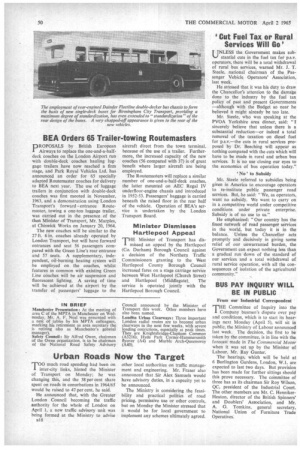'Cut Fuel Tax or Rural Services Will Go'
Page 52

If you've noticed an error in this article please click here to report it so we can fix it.
INLESS the Government makes substantial cuts in the fuel tax for p.s.v. operators, there will be a total withdrawal of rural bus services, warned Mr. J. T. Steele, national chairman of the Passenger Vehicle Operators' Association, last week.
He stressed that it was his duty to draw the Chancellor's attention to the damaIe done to the industry by the fuel tax policy of past and present Governments —although with the Budget so near he believed it might already be too late.
Mr. Steele, who was speaking at the PVOA Yorkshire area dinner, said: "I sincerely believe that unless there is a substantial reduction—or indeed a total removal of the taxation on diesel fuel for p.s.v.—the cuts in rural services proposed by Dr. Beeching will appear as nothing compared with the cuts which will have to be made in rural and urban bus services. It is no use closing our eyes to the economics of bus operation today."
'No' to Subsidy
Mr. Steele referred to subsidies being given in America to encourage operators to re-institute public passenger road services. But, he said: " We, as operators, want no subsidy. We want to carry on in a competitive world under competitive conditions under private enterprise. Subsidy is of no use to us."
He emphasized: "Our country has the finest network of road passenger services in the world, but today it is in the balance. Unless the Chancellor acts promptly and decisively in giving some relief of our unwarranted burden, the Government can expect nothing less than a gradual run down of the standard of our services and a total withdrawal of rural service operation, with all the consequences of isolation of the agricultural community."


































































































































































